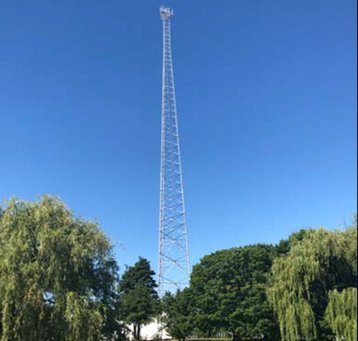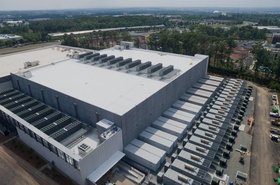The court case between CyrusOne, the city of Aurora, Illinois, and Scientel Solutions over communications towers near the world's largest exchange has ended.
CyrusOne claimed that a communications tower proposed by engineering firm Scientel would interfere with its own tower, designed to provide faster access to the CME exchange, hosted at its Aurora facility. The parties settled the dispute through mediation, according to a Friday update to the case’s docket in federal court in Chicago, first reported by Bloomberg.
The details of the settlement were not released.
Battling towers
In March 2017, CyrusOne gained city approval to build a 350ft (107m) tower at its Aurora campus in Chicago, Illinois, to support microwave and millimeter wireless antenna colocation, and improve the service it offered to customers.
CyrusOne's Aurora I building houses the Chicago Mercantile Exchange Group (CME Group), operator of several large derivatives and futures exchanges. High-frequency traders accessing the exchange via nearby Chicago are so concerned about the latency of their communications, they are prepared to foot the bill to place their own antennas on the mast to get their signals through more quickly.
Traders use microwave communications to reduce latency, as electromagnetic waves travel 50 percent faster in air than in glass fiber. Microwave signals operate by line-of-sight, and only have a range of 30 to 50 miles (50 - 80 km), so this can only save about 100 microseconds - but this is apparently crucial for CME customers, and at 50km (35 miles) away, Chicago is in microwave rante.
The City of Aurora granted CyrusOne a special use permit for the tower, and amended its telecommunications ordinance to require any entity proposing a new tower to demonstrate that it is not able use an existing tower.
In court documents, CyrusOne alleged that its tower was "meant to be a colocation tower that would resolve the frequency congestion issues in the area and equalize wireless access to the CME."
But then, in June 2017, Scientel applied for permission to build its own tower. At 195 foot (60m) this was shorter than CyrusOne's, but it would be just 1,000 feet (300m) east of CyrusOne’s tower and the CME data center, and in the line of sight path to Chicago.
In a September Planning Commission hearing on Scientel's application CyrusOne presented testimony, but was not allowed to cross-examine Scientel's witnesses.
The Planning Commission recommended the tower be approved. Then, in November, the City Council first voted against it, but two weeks later voted to reconsider its decision.
In January 2018, a new council session was held, with Scientel presenting new information that was not part of the public record. Again, CyrusOne was not able to cross-examine the Scientel witnesses, nor was it able to provide rebuttal testimony.
a new council session was held, with Scientel presenting new information that was not part of the public record. Again, CyrusOne was not able to cross-examine the Scientel witnesses, nor was it able to provide rebuttal testimony.
The City Council then granted the application, and CyrusOne filed suit soon after, alleging the Scientel tower would interfere with its own one.
"Construction of the 195-foot communications tower proposed by Scientel on the property east of the CyrusOne tower will interfere with and physically block communication networks attempting to access the CyrusOne tower from the east, and has the potential to cause frequency congestion in the area," CyrusOne claimed.
"This interference with CyrusOne's wireless communications amounts to a post-hoc denial of CyrusOne's special-use permit."
The court denied these claims, ultimately dismissing many of CyrusOne's complaints ahead of this settlement.
Then, earlier this year, Scientel finished building its tower, and said it would move its corporate headquarters to the site.
“The more companies Aurora has in its ecosystem the more innovation opportunities will develop for our constituents,” Michael Pegues, Aurora’s chief information officer, said in a statement this Monday.





